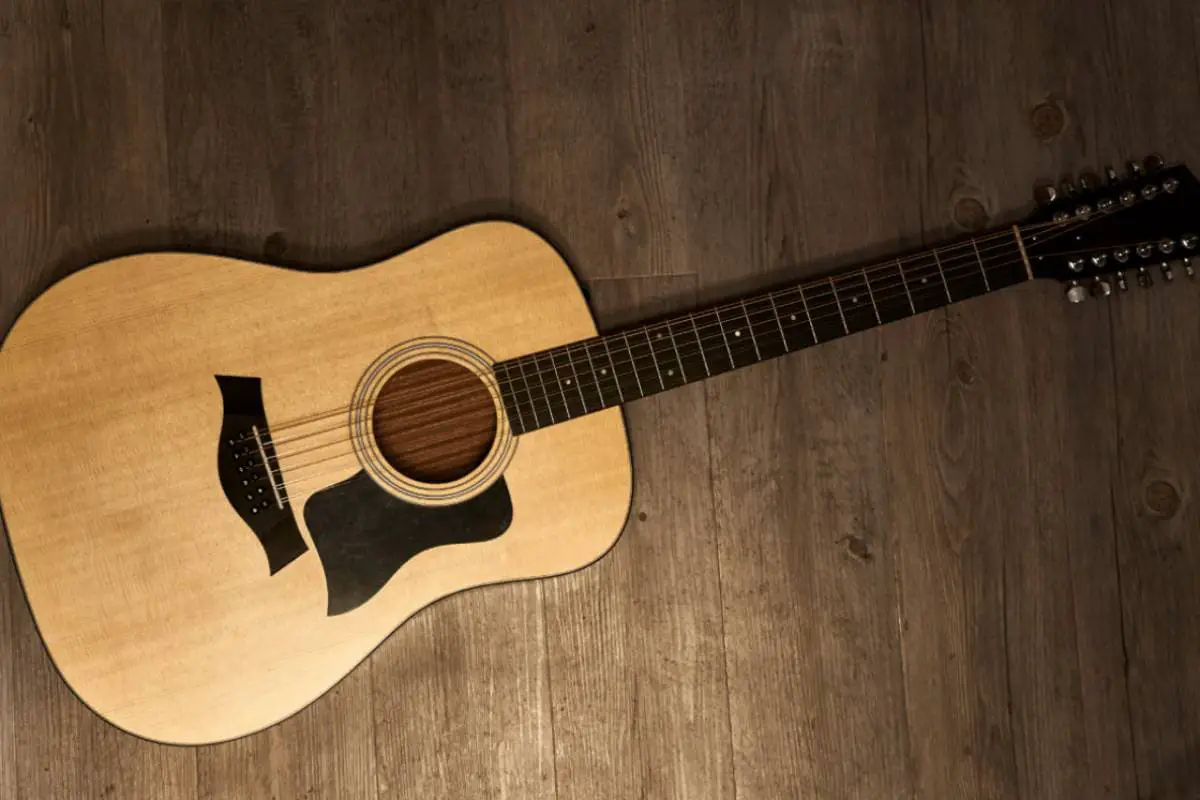Preventing your guitar’s neck from warping can be essential as a warped neck can make it impossible for you to tune your guitar and cause the notes to sound dull. Repairing it can be difficult, and you might not always have the necessary tools, so it’s best to avoid it.
Here’s how you can prevent your guitar neck from warping in 10 easy steps:
- Keep your guitar in a hardshell case.
- Use a guitar stand.
- Use a guitar hanger.
- Maintain proper humidity levels.
- Don’t store your guitar in the basement or garage.
- Don’t leave your guitar out in the sun.
- Loosen the strings when storing your guitar.
- Don’t leave your guitar in your car.
- Keep your guitar away from heat sources.
- Change the strings correctly.
In this article, I’ll explain each of the above steps to help you protect your guitar and ensure that your guitar neck never warps.
👇😀👇NOTE👇😀👇
If you want to find out what my recommended guitar gear is, then here is what I recommend on Amazon:
- Fender Cutaway Acoustic-Electric Guitar Bundle (MY FAVORITE GUITAR)
- Snark SN-8 Super Tight All Instrument Tuner (Easiest Tuner I’ve Used😏)
- 6 String Acoustic Guitar Capo (Best CAPO for quick changes)
- Dunlop Max Grip 1.0mm Nylon Picks (Thick Guitar Pick So You Don’t Lose Grip!)
- Universal Guitar Stand (Cheap & Minimalist Guitar Stand I Recommend)
- Levy’s 2″ Wide Quick Adjust Guitar Strap (Best Guitar Strap For Any Level)
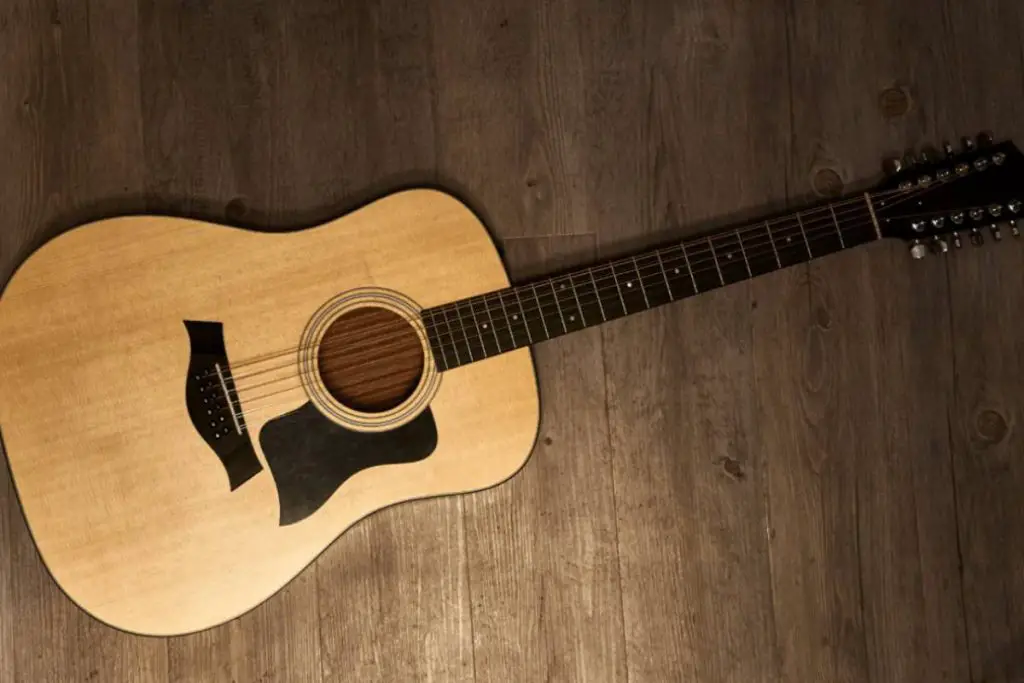
1. Keep Your Guitar in a Hardshell Case
When you’re not playing your guitar, you need to ensure that you’re at least keeping it safe. The best way to do so is by storing it in a hardshell case. If possible, lay the case flat, so there is no pressure on the guitar’s neck.
It might be irritating to constantly take your guitar out of its case to play and then put it back just to take it out an hour later, but it is the only fool-proof way to keep your guitar safe. Leaving your guitar lying around the house or outside makes it vulnerable to heat and humidity changes which can cause the neck to warp.
A hardshell guitar case like this Gator Cases Hard-Shell Wood Case (available on Amazon.com) will work perfectly. The hardshell case is durable, made from plywood, and is covered with ultra-durable black Tolex PVC. It has a spacious interior accessory compartment for all the necessary add-ons. This case in particular provides extra neck support and a plush cushioned lining for protection.
2. Use a Guitar Stand
If you don’t want to continuously put your guitar away throughout the day, you can invest in a guitar stand. These stands are specially made so your guitar will be supported on the lower bout.
Don’t ever place your guitar so that it is lying at an angle against a wall. It can cause the neck to warp. Instead, put the instrument on your guitar stand or lay it down flat on a clean, dry table.
You can get an Amazon Basics Guitar Folding Stand from Amazon.com. This frame will work for any guitar as it has three adjustable width settings. It’s lightweight, durable, and has soft foam arms and a backrest to ensure your guitar doesn’t scratch. This guitar stand can fold flat, so it is easy to put away and will help your guitar stay safe between playing sessions.
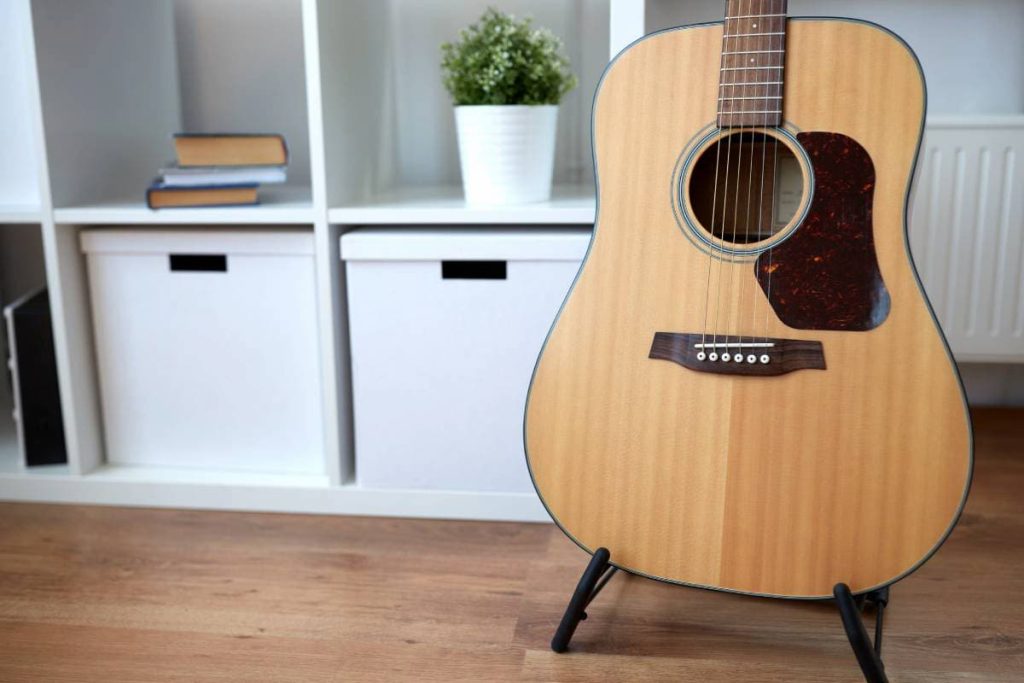
3. Use a Guitar Hanger
Another excellent way to keep your instrument safe is to use a guitar hanger. You can get this Snigjat Guitar Wall Hanger from Amazon.com. They are perfect for keeping any guitar safe and out of the way. These guitar hangers have a unique V-shape bracket, ensuring your guitar is secure and won’t rub against the wall.
Hanging your guitar on a wall hanger exerts the force in a vertical direction, meaning there is no pressure on the neck, protecting it from warping.
This is the ideal solution for somebody who doesn’t want to leave their guitar lying around but also doesn’t want to pack it away in a hardshell case the whole time. A guitar hanger can also add a bit of aesthetic appeal to your space, especially if you have a few guitars hanging on your wall.
4. Maintain Proper Humidity Levels
Maintaining the correct humidity levels in the storage location is the best thing you can do to prevent your guitar’s neck from warping.
Dry air will dry out the wood your guitar is made of, causing it to shrink and warp. If there is a lot of moisture in the air, the wood will swell. The wood that your guitar is made from requires a specific moisture level and temperature for it to stay impact. If the temperature or humidity fluctuate drastically, they can cause severe structural damages to your guitar.
The ideal humidity and temperature levels for most guitars are:
- The perfect humidity level is between 45% and 55% (relative humidity).
- The ideal temperature to keep your guitar in is between 65°F and 75°F (18°C and 24°C).
To ensure that humidity levels aren’t too high or low, you can use a digital hygrometer. Keeping track of the moisture content in the air surrounding the instrument can help prevent your guitar’s neck from warping.
You can get this D’Addario Humidity And Temperature Sensor from Amazon.com. It can fit inside your guitar case and read both the humidity and temperature inside the case. It’s accurate and has a memory feature so you can keep track of the temperature and humidity fluctuations your guitar has been exposed to.
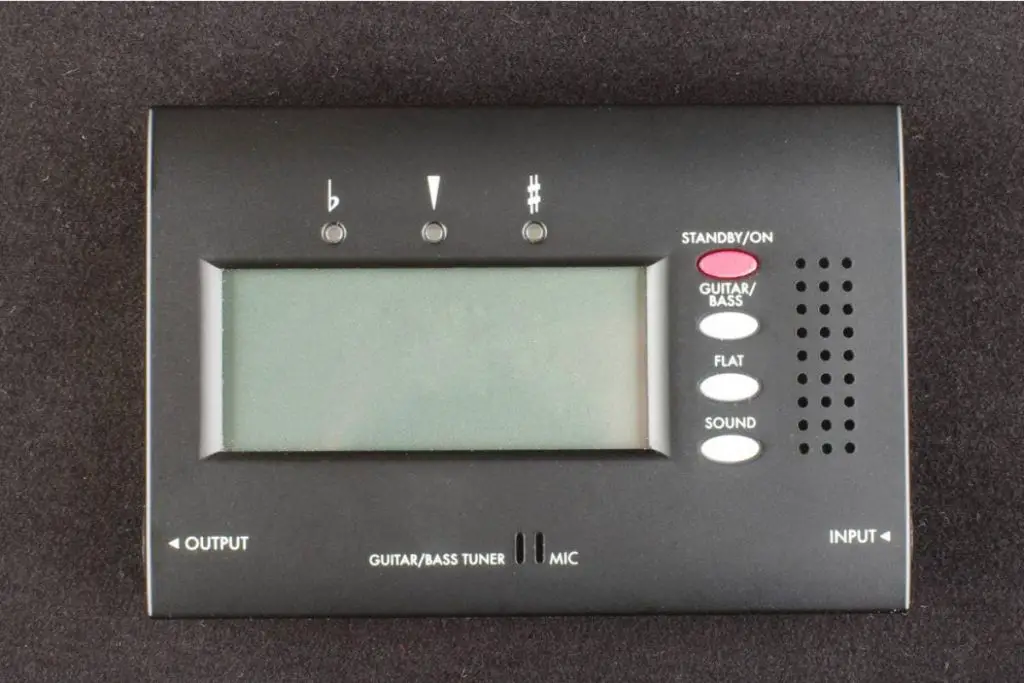
Effects of High Humidity in a Guitar
If you live in an area with extremely high humidity, your guitar’s structural integrity, sound, and longevity can be negatively impacted. It’s important to keep your guitar in a hardshell case and control the humidity inside of it.
Some of the side effects high humidity can have on your guitar include:
- Dull Tone. High humidity can change the sound of your guitar, making it sound dull. It can also affect the volume, which means your guitar won’t sound as loud and vibrant as before.
- Expansion. Hardwood is more susceptible to high humidity than plywood, but no matter what material your guitar is made of, the back of your guitar can start expanding if the humidity is high enough.
- Deterioration of the wood. Extremely high humidity can lead to a wet guitar, which can cause the wood to swell and even to start deteriorating. The swelling can cause the bridges to come loose and the seams to separate.
- Fingerboard issues. If your guitar is exposed to high humidity, the fingerboard develops backflow and loses its relief, which can cause fret buzzing.
- Warped neck. High humidity can cause your guitar’s neck to warp and make it difficult to play. You won’t be able to tune it, and the strings will have a blunt tone.
Ways To Prevent High Humidity From Damaging Your Guitar
The best thing you can do to avoid your guitar’s neck from warping or the instrument itself from suffering any structural damage is to invest in a good quality dehumidifier like this Pro Breeze Electric Dehumidifier (available on Amazon.com). It’s a mini dehumidifier, meaning it won’t take up a lot of space and is ideal for rooms of 215 sq ft. (20 sq meters) in size.
You can always buy a bigger dehumidifier that can service your entire house, but if you’re only looking to protect your guitar, this mini humidifier will be perfect. It can remove up to 9 ounces (0.27 liter) of water a day and has a 16-ounce (0.47 liter) water tank capacity. It is quiet and energy-efficient, so it won’t cost you much to run.
You can also use this Ever Bamboo Guitar Dehumidifier Set (available on Amazon.com). It will absorb excess moisture from the wood of your guitar and protect it from high humidity levels. Store your guitar in a hardshell case and add two pouches by the body and one by the neck to absorb excess moisture. These pouches can last up to a year, but you will have to re-activate them every month using sunlight.
If you don’t have a dehumidifier and can’t afford to buy one at the moment, you can try keeping your guitar in an air-conditioned room. An air conditioner automatically dehumidifies the air and will help prevent your guitar from getting damages. You can also try blow-drying the inside of your guitar case with a hairdryer if you live in an extremely humid area.
Effects of Low Humidity in a Guitar
Low humidity can also cause some severe issues. If humidity levels are exceptionally low, they can cause the wood your guitar is made of to shrink. People living in cold areas need to be particularly cautious of low humidity levels.
Some of the side effects low humidity can have on your guitar include:
- Brittle sound. You want your guitar to sound good, and a brittle sound is not pleasant to the ears.
- Moisture loss. In high humidity, the wood that your guitar is made of loses moisture which can cause it to shrink.
- Cracks. As the wood shrinks, the process can lead to cracks forming on your guitar.
- Warped neck. Shrinkage is the biggest problem when it comes to low humidity levels, as it can cause the neck of your guitar to warp.
- Structural damage. High humidity can cause the edges of your guitar to come loose and gaps to form.
- Deformation. The top of your guitar can lower and sink in.
Ways To Prevent Low Humidity From Damaging Your Guitar
Preventing low humidity from damaging your guitar has to be a priority. You don’t want your guitar’s neck to warp as it makes playing difficult, and it can be challenging to fix yourself, especially if you aren’t experienced. Guitar repairs can be expensive, so it is best to avoid any damage to your guitar.
The best way to prevent low humidity from damaging your guitar is to get a two-way humidifier system like this D’Addario Guitar Humidifier System (available from Amazon.com). It provides automatic humidity control, which means you can use it in low or high humidity spaces to ensure the moisture in your guitar case stays constant.
It will protect your guitar from warping and cracking as it ensures a relative humidity between 45% and 50% in your guitar case at all times. Using this two-way system will make your life much easier as the moisture-filled packets absorb or release moisture as necessary.
5. Don’t Store Your Guitar in the Basement or Garage
If you want to put your guitar away and store it for a longer period, you should make sure that you keep it in a hardshell case and in the right environment.
Never store your guitar in the basement or garage. These areas tend to have high humidity levels and colder temperatures which can cause the moisture levels of your guitar to change and the neck to warp. You won’t even know that something is wrong with your guitar until you decide you want to play again, and having to deal with a warped neck might stop you from taking up playing ever again.
As mentioned, mixing a warped guitar neck is possible, but it’s a lot of work if you do it yourself, and taking it to a shop to be repaired can be expensive, so don’t take any shortcuts when it comes to storing the instrument.
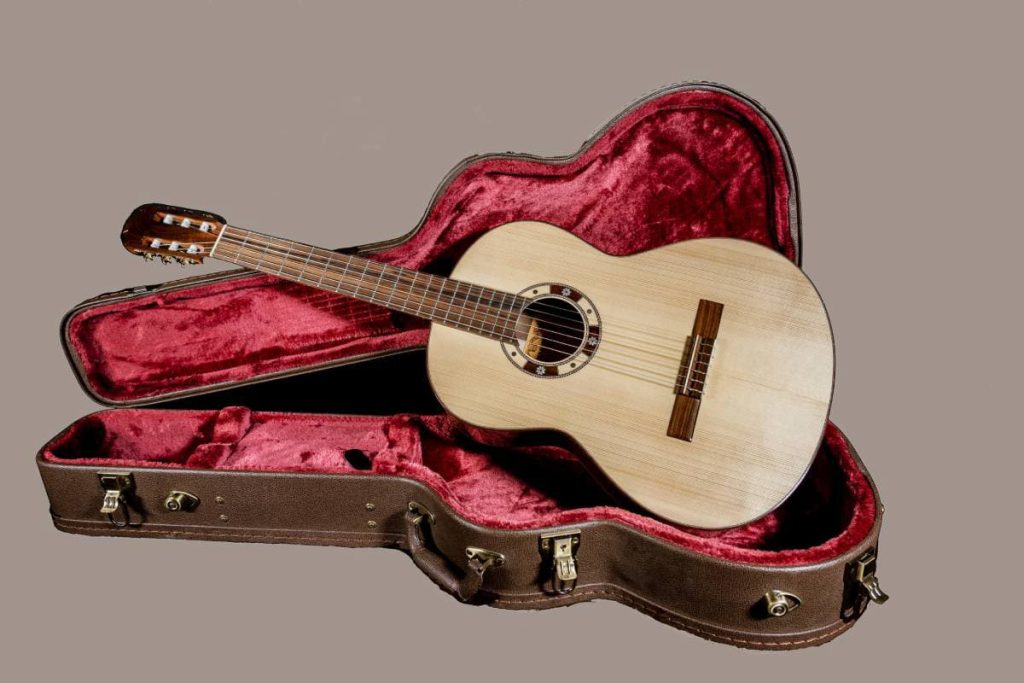
6. Don’t Leave Your Guitar Out in the Sun
Sitting outside on a hot summer day, playing your guitar, and singing along with some friends might sound like fun but don’t forget to take your guitar inside when you’re done playing.
Leaving your guitar outside in the sun is a terrible idea and should never be done. The heat from the sun can cause the wood to dry and the guitar’s neck to warp. Playing your guitar outside in the sun is fine but make sure to put it back in its case and inside the house where it’s safe to stay for prolonged periods.
7. Loosen the Strings When Storing Your Guitar
If you will not be using your guitar for a while and are planning or storing it, make sure to loosen the strings beforehand. You don’t need any tension on the neck of your guitar while it isn’t being played.
Loosening the strings will remove any excess tension on the neck and prevent it from warping over time. When playing your guitar regularly, this is unnecessary as the strings will loosen when you play, and you will be tuning it often, so there won’t be continuous tension without any movement.
8. Don’t Leave Your Guitar in Your Car
You might be a busy person who likes to take your guitar everywhere with you. This is understandable and can make for many fun jamming sessions, but make sure to never leave your guitar lying in your car. Transporting the instrument in your car is perfectly fine as long as you keep it in a hardshell case and consider humidity and temperature levels inside the vehicle.
The sun’s rays can be harsh, and if you leave your guitar in your car for long periods of time, the temperature and high humidity on a scorching day can cause the wood to shrink and warp.
9. Keep Your Guitar Away From Heat Sources
If you live in a cold area where during the winter temperatures drop significantly low, you might want to have a few heaters on or even a fire going in your fireplace. This will warm up your house and create a comfortable environment. However, too much heat is not good for your guitar either.
Sitting next to the fire and playing a few songs is fine, but don’t place your guitar down anywhere close to a heat source. Heating up your house can cause your guitar to dry, leading to it shrinking, cracking, and the neck warping.
Take care of your guitar and put it away in a safe place where you can make sure the humidity level is ideal when you are not playing it.
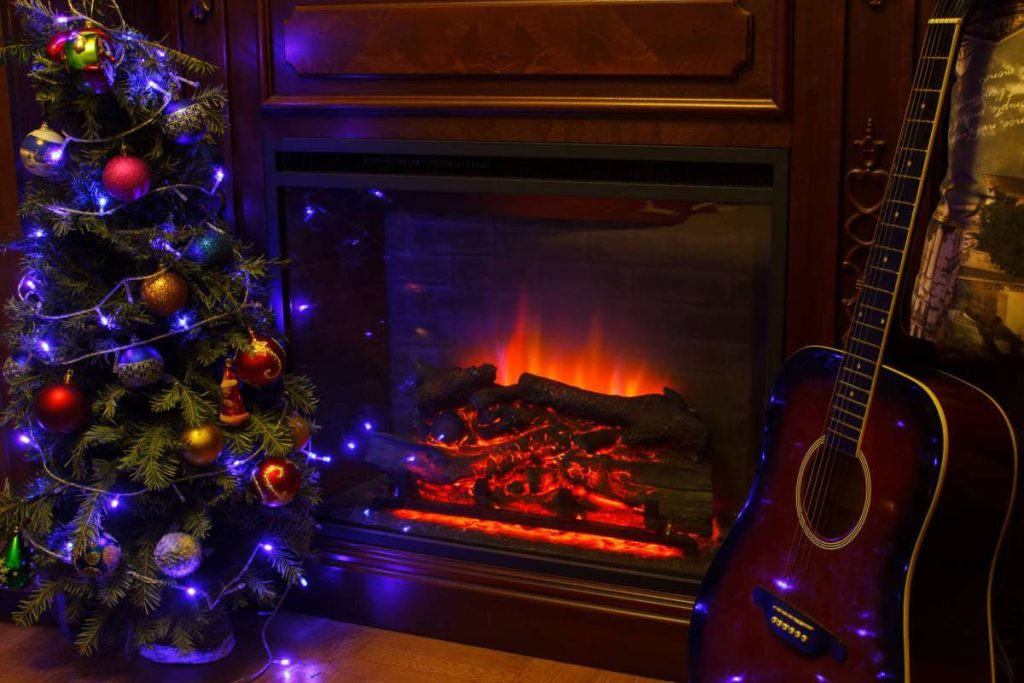
10. Change the Strings Correctly
Make sure to change your guitar’s strings correctly; if you over-tighten them and then leave them as they are without tuning your guitar, the tension can cause the neck of your guitar to warp. Heavy gauge strings can also cause your guitar’s neck to warp if you don’t adjust the truss rod to accommodate them.
This doesn’t mean that you shouldn’t change your strings or play with heavy gauge ones; just be careful not to over-tighten them. Always tune your guitar immediately after changing your strings to avoid tension on the neck, and adjust your truss rod if you’re using heavy gauge strings.
Here’s an informative YouTube video showing how to change your guitar strings correctly. Follow these easy instructions to ensure that you don’t put too much tension on your guitar’s neck.
Final Thoughts
No musician wants their guitar’s neck to warp. Luckily, the phenomenon can easily be prevented by following these ten easy steps.
Always protect your guitar by keeping it in a hardshell case in an area with the right temperatures and humidity. You can buy a dehumidifier or a two-way humidifying system to ensure the humidity level is always ideal for your guitar.
Take care of your guitar, don’t leave it lying around, and keep it away from heat and out of direct sunlight to prevent any damage.
👇😀👇NOTE👇😀👇
If you want to find out what my recommended guitar gear is, then here is what I recommend on Amazon:
- Fender Cutaway Acoustic-Electric Guitar Bundle (MY FAVORITE GUITAR)
- Snark SN-8 Super Tight All Instrument Tuner (Easiest Tuner I’ve Used😏)
- 6 String Acoustic Guitar Capo (Best CAPO for quick changes)
- Dunlop Max Grip 1.0mm Nylon Picks (Thick Guitar Pick So You Don’t Lose Grip!)
- Universal Guitar Stand (Cheap & Minimalist Guitar Stand I Recommend)
- Levy’s 2″ Wide Quick Adjust Guitar Strap (Best Guitar Strap For Any Level)
Related Posts:

